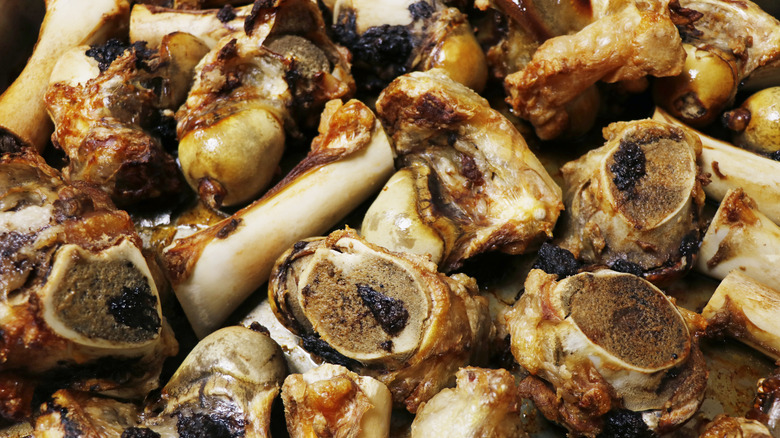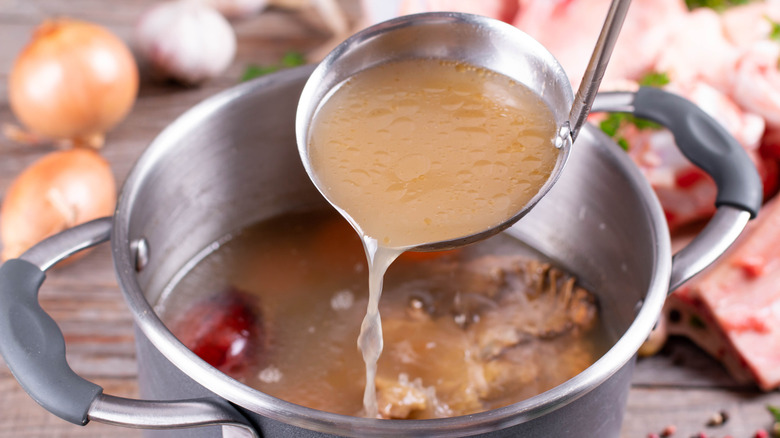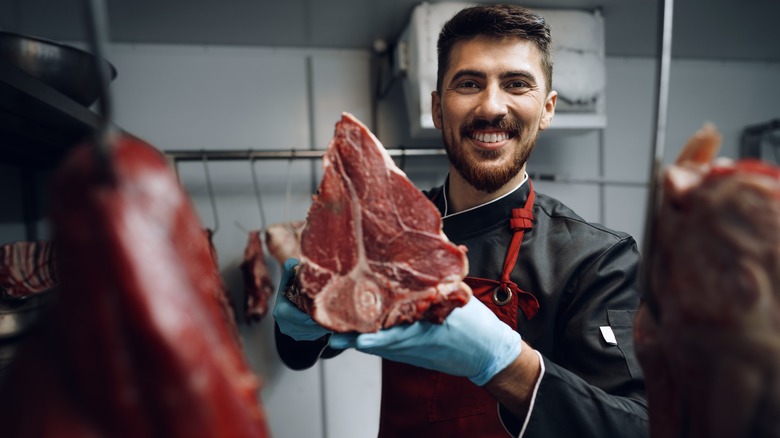Why You Should Buy Bones As Well As Meat From Your Butcher
One of the easiest ways to take your homemade soups and sauces to the next level is to start with homemade stock. Sure, pre-packaged broth is easier, but the store-bought stuff also often comes with extra ingredients that you might not want, like salt, preservatives, and MSG. Pre-made stock can also get expensive if you need more than a cup or two, especially when compared to a soup pot full of the homemade stuff. Making stock at home suffers from a bit of an image problem because people think it's time-consuming, but stock is actually extremely easy to make. You can even use an Instant Pot to speed up the process. The biggest hurdle, however, is getting enough bones together to make a proper stock. Most of us don't have a pile of veal bones sitting around in the refrigerator, but there is someone who does: Your local butcher.
Behind every chef and home cook is a good butcher (at least for omnivores). Julia Child was famously dedicated to Savenor's in Cambridge, Massachussetts, for example. Take a page out of her book and get to know your local meat monger to get the inside scoop on the best cuts, what is (and isn't) a good deal, and to get your hands on some bones for making stock and bone broth at home.
Good food starts with good bones
Whether you're trying to slurp more bone broth (it is super healthy after all), or making stock for bases of homemade soups and sauces, you're going to need some bones. In commercial kitchens, there's typically a stock pot or two on the stove every night simmering up the liquid gold, but that's because they order cases of veal bones with every meat order. When you're shopping for meats for home cooking, almost everything has the bones removed, and even if it's a cut that comes with the bone (like a T-bone steak), there really isn't enough to use for a stock. Sometimes you can find single veal or beef bones for sale in the pre-packaged meat case, but you'll need more than one or two to make a stock or broth. The good news is that your butcher always has bones, and they aren't that expensive. All you have to do is ask.
The meat in the grocery case doesn't magically appear there without the bones, of course. All day, the butchers are in the back breaking down and deboning big pieces of meat, making cuts, and packaging it all up with shrink wrap for your dinner. The byproduct is a lot of bones, and they cost the store money to get rid of them. If you ask your butcher if they have any extra bones to sell, they'll usually happily pack a few pounds up for you, and sometimes you can even get them for free.
Make friends with your butcher
Most of the time your butcher will have to charge you a few dollars for extra bones, especially veal bones which are in higher demand, and also if the person you ask isn't in charge. But if you're a regular and you don't show up asking a lot of questions when the store is super busy, a lot of butchers will cut you a deal on beef, pork, and chicken bones.
Even if your butchers are the staff at the meat counter of a large supermarket, chances are you'll see the same people every week if you start asking some questions and ordering meat from the counter instead of grabbing packs of pre-packaged portions from the cooler. A good butcher will have good advice if you're stumped on a food-related dilemma, like whether to serve prime rib or beef tenderloin for Christmas Eve. Plus, they'll get to know your likes and dislikes, so you'll be the first to know when the good Wagyu comes in. If you use your local butcher as a reference, you'll always have a pro to help you shop for meat, and plenty of bones for making all your bones and broths.


